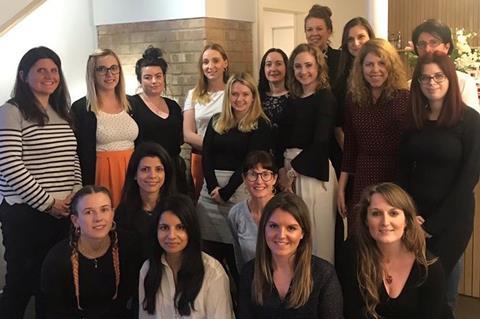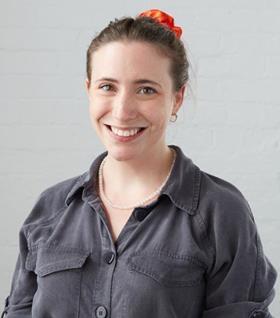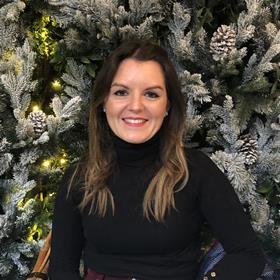IWD: As part of its efforts to boost gender diversity within the broadcast tech and services sector, in 2018 Rise launched a mentor scheme to help women advance their careers. IBC365 spoke with two graduates of the 2019 programme about its impact on their careers.

Rise launched as a gender advocacy trade group at IBC2017, with the aim of advancing the careers of women in non-craft roles in the broadcast industry. It was established after a survey of the industry showed that out of 1,500 manufacturer and service companies fewer than 2% had female chief executives and only 10% of manufacturers had women on their boards or senior executive teams.
Key to its mission is mentoring; mentoring schemes have been credited with helping participants to identify career goals, spot and correct gaps in skills and knowledge and boost confidence. Indeed, some of the aims of the Rise mentoring scheme are to help mentees develop strategies to develop their careers and expand their networks and make new connections.
Rise’s 2019 mentor programme paired 23 women with senior leaders from across the media industry. Among those taking part were Charlotte Wearden, marketing and PR manager at broadcast technology services provider Timeline Television and Megan Johnston, senior partnerships manager, Sky Production Services. They shared their experiences with IBC365.
International Women’s Day IBC365 is celebrating International Women’s Day by publishing a week-long series of conversations with inspirational women in craft, technology and leadership roles. Click here
IBC365: How did you become involved in the Rise mentor programme?
Megan Johnston I applied to the 2019 Rise mentor programme in pitch dark on my phone, doing a night feed for my son, who was about four months old at the time. I can’t remember what I put on my form but my urgent need for help must have been clear! I felt really disconnected from the industry on maternity leave and most of all I was worried about my career – I loved my job at a small post house, I had been there for years, but it was extremely intense and I knew I couldn’t go back to it after my maternity leave. I really needed help to define what I wanted, how I could balance that with my new family, and how I could achieve it. I was accepted onto the programme and my journey began.
Charlotte Wearden: I first heard about Rise at the Media Production Show in 2018 where the previous mentees were on a panel talking about their careers and the mentoring programme. It sounded like such a great opportunity to help me with my career progression, as well as increase my network within the broadcast industry. I decided to follow Rise on Twitter and as soon as the new programme was launched, I applied to be a mentee. It has honestly been one of the best things I could have done and two years on I am still in regular contact with the other mentees and it’s great to have a support network.

IBC365: What form did the mentor scheme take?
MJ: My mentor, the brilliant Adrian Bull of Cinelab, was a huge support and we mainly spoke on the phone. This was coupled with meetups with the other mentees where we would network, attend workshops, hear from industry leaders, and meet each other’s mentors too, so while I had my focused one-on-one sessions I also benefitted from building relationships with a hugely rich, diverse, wonderful group of women in the industry.
CW: Over the course of the six-month mentoring programme, I had monthly face-to-face meetings with my brilliant mentor Carla Trancosco-O’Reilly as well as regular evening group meetings with the other mentees and the founder, Carrie Wootten.
Carrie organised for broadcast industry leaders to attend those sessions to share their experience in the industry and their career path to date. Separately to this, she organised a ‘Meet the Mentors’ session in the form of a speed networking event. She also arranged for us to have free passes to the IBC Conference and the DPP Tech Leaders Briefing to experience meeting and listening to industry experts. These sessions were so inspiring and invaluable on how to progress within the industry.
Finally, Carrie set up some amazing workshops on personal development with Sallee Poinsette-Nash from Brandable. These sessions were so insightful for highlighting how best to present ourselves and promote all of the excellent and proactive work we are doing professionally to help enhance our personal profile and that of our company.

IBC365: What were the top things that you learnt during the programme?
MJ: Firstly, identify what you want, and work smart to achieve it. And secondly, your network is worth its weight in gold.
CW: The programme highlighted the importance of having a support network and how key it is to attend industry events. It’s so important to be able to hear the latest industry news and share ideas that we can all benefit from.
The whole concept of the programme was to develop our confidence and to think about how we portray ourselves, our achievements and how we can drive forward our own careers. It taught me to identify my attributes, develop my self-branding and recognise that I am responsible for promoting myself to reach the next level in my career.
Listening to these leaders in the industry made me reflect on my own role and where women on the whole are positioned in the industry and made me think of ways to help make a change.
IBC365: How were you able to apply those learnings at work?
MJ: Mentoring really helped me to see more clearly what I wanted – the practical side of stability, structure, a reduced commute so I wouldn’t miss bedtimes, yes, but also the buzzy, fast pace of broadcasting and the “no two days the same” environment that I do best in. I have had my eye on Sky for years, but mentoring helped me be more strategic; I was asking the right people the right questions, found an opening at Sky down the road from where I live, and got the job I’d been looking for at last.
CW: Having had a marketing specialist from the broadcast industry as my mentor and using all that I had gained from the mentoring programme has empowered me to be much more confident in my role and my approach in the industry. I have become much more proactive in attending events and engaging with others to boost my network in the broadcast industry which in turn leads to potential commercial opportunities for my workplace.
I have expanded my use of the multiple marketing channels available to highlight projects, events and achievements to help raise my profile and give more exposure to Timeline. Furthermore, I am working on ways to encourage a more diverse workforce. I have been involved in getting our company working with SVG Women in Sport, getting our female staff to voice their challenges and ideas through panels as well as assisting in launching Timeline’s own podcast in which these topics are spoken about. More recently I highlighted to the company directors the importance of supporting initiatives such as Rise Up and I am delighted Timeline has become a sponsor.
IBC365: What is the biggest barrier to women progressing into leadership roles in media and broadcast?
CW: More conversations need to happen about how to bring women into more senior positions and how they can really add value at the top. A 2020 McKinsey report found that companies who focus on racial and ethnic diversity are 36% more likely to have financial returns that are above average for their industry and furthermore companies with a gender balance are 25% more likely to outperform those who do not.
Therefore, more needs to be done to educate those at the top of the benefits of a more diverse leadership team and if there is a fear that women lack the right skillsets then perhaps more technical and leadership training needs to be offered. Also, there is a lack of women entering the industry to take on those roles so more needs to be done to attract women from a younger age.
MJ: I wish every workplace was as family-friendly as Sky. I know from speaking to other mums in different areas of the industry that women often feel that they must choose which to prioritise, their family or their career, or that they can do one but at the expense of the other – and having children at home in the pandemic seems to have amplified this. I think more flexibility around working time (with a focus on delivery, not hours) and more leadership schemes for women would be a start.
IBC365: What needs to happen for there to be equal gender balance in the broadcast industry?
CW: For there to be an equal gender balance in the broadcast industry Rise has identified there is a need to capture school-aged children’s interest and really showcase the exciting and creative aspects of broadcast engineering.
Additionally, for there to be a more equal representation and more diversity, there needs to be increased support and training to provide more progression routes for women within the industry to ensure that they want to stay.
Finally, there is a requirement to support women with children such as with job share roles or flexi-working hours which would really help with this issue.
I am so happy and proud that Timeline is actively involved in all three of these areas.
MJ: So many things would help – the conscious decision to hire differently; a culture shift focusing on delivery and not hours at the desk; more flexibility around working from home – I think the pandemic has actually helped the industry make big strides on this. I also think there are lots of positive things happening around us already; for example Rise has launched it’s first Rise Up UTC (University Technical Colleges) mentoring programme, supporting young women in their journeys into the broadcasting sector. There are also schemes like Film London’s Return to Work in Post & VFX that supports parents and carers that want to find their way back in after a break, and Sky’s own Returner Programme supports this too.
Rise’s mentoring scheme is open for applications from Monday 8 March 2021. This year, it is also open to women from the US and Canada, in addition to the UK and Singapore. More information here














![Adeline Platform Help[64]](https://d3dh6of9cnaq4t.cloudfront.net/Pictures/100x67/0/6/9/30069_adelineplatformhelp64_996092_crop.png)









No comments yet